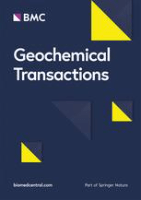
GEOCHEMICAL TRANSACTIONS
Scope & Guideline
Transforming Geochemical Data into Global Solutions
Introduction
Aims and Scopes
- Environmental Geochemistry:
Research on the chemical composition and quality of water bodies, including assessments of pollution levels, health risks, and the effects of human activities on aquatic systems. - Mineral Geochemistry:
Studies focusing on the geochemical properties of minerals, including crystal growth, mineral transformations, and the geochemical behavior of elements within different geological contexts. - Hydrogeochemistry:
Investigation of the chemical characteristics of groundwater and surface water, including the interactions between water and geological materials, and implications for water resource management. - Geochemical Modeling and Theoretical Studies:
Development and application of theoretical models to understand geochemical processes, including adsorption mechanisms, mineral stability, and isotope fractionation. - Geochemical Risk Assessment:
Assessment of the environmental and health risks associated with heavy metal contamination and other toxic elements in various ecosystems, particularly in relation to human health.
Trending and Emerging
- Impact of Climate Change on Water Quality:
Recent studies have increasingly focused on how climate change and anthropogenic activities affect water quality, particularly in river systems, highlighting the importance of understanding water rejuvenation processes. - Heavy Metal Contamination and Public Health:
There is a rising emphasis on assessing the health risks associated with heavy metal contamination in aquatic ecosystems, reflecting a growing concern for public health implications and environmental safety. - Geochemical Interactions in Carbon Storage:
Research on basalt-water-CO2 interactions for carbon storage solutions is emerging as a significant area, driven by the global need for effective carbon sequestration strategies. - Remote Sensing Applications in Geochemistry:
The use of remote sensing technologies to study hydrothermal processes and mineral alterations indicates a trend towards integrating advanced technologies in geochemical research. - Microbial Influence on Mineral Processes:
An increasing number of studies are exploring the role of microbial activity in mineral transformations and biogeochemical cycles, highlighting the intersection of microbiology and geochemistry.
Declining or Waning
- Agricultural Geochemistry:
Research related to the geochemistry of soils and their impact on agricultural practices has become less frequent, indicating a potential shift away from agricultural applications towards more environmental and mineralogical studies. - Sedimentary Geochemistry:
Studies focusing on the geochemical analysis of sedimentary formations and their historical implications are appearing less often, suggesting a waning interest in this specific area within the broader geochemical research. - Geochemical Techniques and Instrumentation Innovations:
While important, the focus on new geochemical techniques and instrumentation appears to be less prevalent, possibly due to a saturation of existing methodologies and a shift towards applied geochemistry and case studies.
Similar Journals
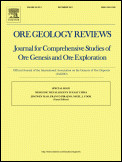
ORE GEOLOGY REVIEWS
Advancing the Frontiers of Ore GeologyORE GEOLOGY REVIEWS is a premier academic journal published by Elsevier, renowned for its influential contributions to the fields of Economic Geology, Geochemistry, and Petrology, and Geology. With its esteemed Q1 ranking across these disciplines in 2023, it occupies a leading position in shaping scholarly discussions and advancements within the geological sciences. With an impressive Scopus ranking—47th in Earth and Planetary Sciences for Geology, and among the top 40 in Geochemistry and Petrology—this journal serves as an essential resource for researchers, professionals, and students committed to advancing knowledge in ore geology. Having transitioned to an Open Access model in 2022, ORE GEOLOGY REVIEWS enhances the accessibility of high-quality research, promoting wider dissemination and engagement with cutting-edge findings from 1986 to 2024. As a valued publication addressing the intricacies of ore deposits and geochemical processes, it aims to foster interdisciplinary collaboration and innovation in the field.

GEOCHEMICAL JOURNAL
Fostering Interdisciplinary Collaboration in GeoscienceGEOCHEMICAL JOURNAL, published by the Geochemical Society of Japan, stands as a pivotal platform for researchers and professionals dedicated to the fields of geochemistry and petrology, as well as geophysics. With the ISSN 0016-7002 and E-ISSN 1880-5973, this journal has been disseminating cutting-edge research since its inception in 1966 and continues to provide invaluable insights into the complexities of Earth's processes. Currently categorized in the Q3 quartile for both Geochemistry and Petrology and Geophysics, the journal ranks in the 40th and 36th percentiles, respectively, as per Scopus metrics, reflecting its growing influence and relevance in the scientific community. The journal accepts a range of scholarly articles, aiming to foster a deeper understanding of geochemical phenomena while promoting interdisciplinary collaboration among academicians and practitioners. Although not open access, the GEOCHEMICAL JOURNAL's commitment to quality research and education underscores its vital role in advancing the discourse within geoscience.

Vestnik of Saint Petersburg University Earth Sciences
Pioneering Research in Geography and GeologyVestnik of Saint Petersburg University Earth Sciences, published by ST PETERSBURG UNIV PRESS, serves as a pivotal platform for the dissemination of innovative research within the fields of Earth Sciences, Environmental Science, Geography, and Geology. This journal, with an ISSN of 2541-9668 and an E-ISSN of 2587-585X, aims to foster scholarly communication and facilitate advancements in understanding the diverse and complex interactions within our planet's systems. Operating from the Russian Federation, the journal is unique in its commitment to an open-access model, making critical research accessible to a global audience of researchers, professionals, and students. Although currently classified in the Q4 quartile in several relevant categories, its ranking showcases the potential for growth and increased impact within the academic community. Aiming to converge ideas and findings from 2017 to 2024, the Vestnik of Saint Petersburg University Earth Sciences is dedicated to enriching the dialogue and supporting collaborative research efforts in disciplines crucial for sustainable development and environmental stewardship.

Mineralogical Journal-Ukraine
Illuminating the path to understanding geochemical processes.Mineralogical Journal-Ukraine is a key academic publication dedicated to advancing the field of mineralogy and geochemistry, under the esteemed auspices of the M.P. Semenenko Institute of Geochemistry, Mineralogy & Ore Formation of NAS Ukraine. Since its inception in 2019, this journal has established itself as an essential resource for researchers and professionals engaged in the study of energy, fuel technology, and the earth sciences, despite its present rankings reflecting a developing impact within these specific categories on Scopus. Published in Ukrainian and available in both print and online formats, the journal not only aims to disseminate high-quality research but also encourages inclusive access to vital findings in mineral exploration, petrology, and geochemical processes. With a commitment to excellence and an expanding scope of research, Mineralogical Journal-Ukraine stands as a pivotal platform for innovation and collaboration among scientists striving to understand the complexities of mineral formation and ore deposits.
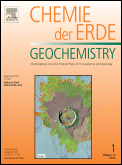
Geochemistry
Connecting Research and Innovation in Earth SciencesGeochemistry is a distinguished academic journal published by Elsevier GmbH, focusing on the intricate study of geochemical processes across earth systems. With its ISSN 0009-2819 and E-ISSN 1611-5864, this journal serves as a crucial platform for scholars and researchers eager to disseminate their latest findings in geochemistry, petrology, and geophysics. The journal has established itself within the scientific community, achieving a Q2 ranking in both Geochemistry and Petrology as well as Geophysics, showcasing its significant impact and relevance—ranking 18th out of 165 in Geophysics and 26th out of 154 in Geochemistry and Petrology according to Scopus. From its inception in 1978 to its ongoing contributions through 2024, Geochemistry remains a vital resource for academic discourse and innovation in earth sciences. As an open-access title, it allows for broader dissemination of knowledge, promoting accessibility for researchers, students, and professionals. Whether you are engaged in theoretical research or applied studies, Geochemistry provides the insights necessary to advance our understanding of the planet's chemical complexity.
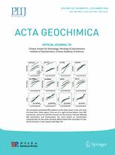
Acta Geochimica
Pioneering Research in the Chemical Composition of Our World.Acta Geochimica is a prominent academic journal published by SPRINGER INT PUBL AG, focusing on the dynamic fields of Geochemistry and Petrology. Established in 2016, this peer-reviewed publication has quickly gained recognition within the scientific community, currently holding a category quartile ranking of Q3 in Geochemistry and Petrology as of 2023. With its ISSN 2096-0956 and E-ISSN 2365-7499, the journal offers a platform for researchers and professionals to disseminate and discuss significant advancements in the study of the chemical composition of the Earth and other celestial bodies. While it is not an open-access journal, Acta Geochimica plays a vital role in fostering collaboration and innovation among scientists, contributing to a deeper understanding of geochemical processes. Located in Switzerland at Gewerbestrasse 11, Cham CH-6330, Switzerland, this journal is a critical resource for students, researchers, and professionals seeking to push the boundaries of knowledge in Earth sciences.
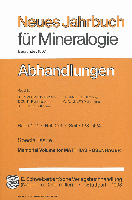
NEUES JAHRBUCH FUR MINERALOGIE-ABHANDLUNGEN
Championing impactful research in Earth sciences.NEUES JAHRBUCH FUR MINERALOGIE-ABHANDLUNGEN, published by E Schweizerbart'sche Verlagsbuchhandlung in Germany, is a distinguished scholarly journal dedicated to advancing the fields of mineralogy and petrology. With an ISSN of 0077-7757, it provides a platform for researchers to disseminate high-quality findings that contribute to our understanding of Earth sciences. Although it currently has no open access options, the journal remains vital for professionals seeking to engage with impactful research in geochemistry and petrology, as reflected in its 2023 Scopus ranking in the 21st percentile within its category. The journal has documented significant research from 1980 to 1988 and resumed from 1996 to 2023, making it a crucial archive for historical and contemporary studies. Despite its current Q4 quartile ranking, NEUES JAHRBUCH FUR MINERALOGIE-ABHANDLUNGEN is an important contributor to the academic discourse in its field, and it invites researchers, professionals, and students alike to explore and submit their work that drives innovation and understanding in mineralogical studies.

Periodico di Mineralogia
Advancing Knowledge in Mineralogy and GeosciencesPeriodico di Mineralogia, published by SAPIENZA UNIV EDITRICE, is a distinguished academic journal based in Italy that has been pivotal in advancing the fields of Geochemistry, Geology, and Geophysics since its inception in 1979. With an ISSN of 0369-8963 and an E-ISSN of 2239-1002, the journal boasts a solid reputation reflected in its Q3 category rankings across these disciplines as per 2023 metrics. The journal’s scope encompasses a broad range of topics related to mineralogy and earth sciences, providing a vital platform for researchers, professionals, and students to disseminate their findings. Despite the absence of an Open Access option, Periodico di Mineralogia remains an essential resource for the dissemination of high-quality research that contributes to our understanding of earth processes and materials. Situated in the heart of Rome at PIAZZALE ALDO MORO 5, it serves as a crucial bridge between academic research and practical applications in geology and planetary sciences.

MINERALOGY AND PETROLOGY
Connecting Geochemistry, Petrology, and GeophysicsMINERALOGY AND PETROLOGY, published by Springer Wien, is a premier academic journal that has been contributing to the fields of geochemistry, petrology, and geophysics since its inception in 1987. With an ISSN of 0930-0708 and an E-ISSN of 1438-1168, this journal is recognized for its rigorous peer-reviewed articles that advance the understanding of mineral and rock formation processes, their physical and chemical properties, and the implications for broader Earth sciences. Holding a respectable impact factor and categorized in the Q2 quartile for both Geochemistry and Petrology, as well as Geophysics, MINERALOGY AND PETROLOGY ranks favorably among its peers, placing it within the top 50% of scholarly publications in these fields. Researchers, professionals, and students alike will find a wealth of knowledge in its pages, as it serves as a valuable resource for those aiming to explore the complexities of Earth's materials and compositions. Although it does not offer an Open Access option, the journal assures high-quality, impactful research that is crucial for ongoing advancements in Earth sciences.

GEOCHEMISTRY INTERNATIONAL
Fostering Innovation in Earth and Planetary SciencesGEOCHEMISTRY INTERNATIONAL, an esteemed journal published by MAIK NAUKA/INTERPERIODICA/SPRINGER, serves as a vital platform for researchers in the fields of geochemistry, petrology, and geophysics. With a deep history reaching back to its inception, the journal spans significant converged years from 1977 to 1978 and continues its publication through 2024. Although it currently does not offer Open Access options, its scholarly impact is underscored by an established reputation indicated by its Q3 categorization in both Geochemistry and Petrology and Geophysics for 2023. Researchers can leverage this platform to disseminate groundbreaking findings and engage with contemporary discussions in Earth and planetary sciences, where it ranks at the 39th and 32nd percentiles within its respective categories. The journal is an essential resource for professionals, students, and scholars seeking to deepen their understanding of geochemical processes and evolve scientific discourse within this dynamic field.